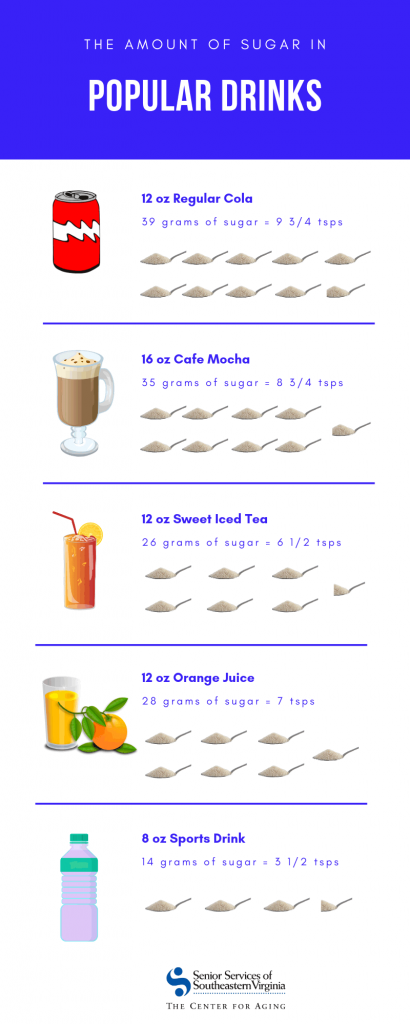
Rethink Before You Drink
Learn how a few sips of flavor can add lots of sugar to your diet
 Added sugar has been linked to negative health outcomes, including more cavities, increased chances of being overweight and obese, and even higher risk for heart disease, Type 2 diabetes, and some cancers. Overall, diets that are higher in added sugar are less healthy, and it may be difficult to meet nutrient needs if large amounts of added sugar are taking the place of healthy foods in the diet.
Added sugar has been linked to negative health outcomes, including more cavities, increased chances of being overweight and obese, and even higher risk for heart disease, Type 2 diabetes, and some cancers. Overall, diets that are higher in added sugar are less healthy, and it may be difficult to meet nutrient needs if large amounts of added sugar are taking the place of healthy foods in the diet.
According to the current Dietary Guidelines for Americans, we should limit the added sugar in our diet to less than 10 percent of our daily calories. The American Heart Association takes that advice a step further and states that women should limit their added sugar intake to a maximum of 6 teaspoons per day and men to a maximum of 9 teaspoons per day.
On average, Americans eat 17 teaspoons of added sugar each day: that’s more than a third cup! Almost a third of that comes from snacks and sweets, and close to half of the added sugar in the American diet comes from sugar-sweetened drinks such as coffee, sweet tea, soda, and sports and energy drinks.
The only drink included in the infographic that contains valuable nutrients is the fruit juice; however, you miss out on the fiber and satisfaction of eating fruit when you drink juice. The best idea is to limit juice to about 4 oz per day and eat real fruit instead. These sweet drinks provide calories without important nutrients like fiber, vitamins, and minerals.
Water is the best way to add fluid to your daily routine without adding calories, and it’s the most effective way to quench your thirst.
About the Author
Kirsten Romero, MS, RDN, is a registered dietitian with the wellness program at Senior Services of Southeastern Virginia.




